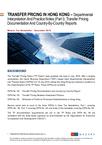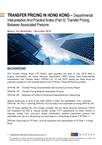
December 2019 - Transfer Pricing In Hong Kong - Departmental Interpretation and Practice Notes
December 2019 - Transfer Pricing In Hong Kong
The Transfer Pricing Rules (“TP Rules”) were gazetted into laws in July 2018. After a lengthy consultation, the Inland Revenue Department (“IRD”) issued three Departmental Interpretation and Practice Notes (“DIPNs”) on 19 July 2019, stating the Hong Kong tax authority’s positions in the implementation of the TP Rules. These DIPNs are as follow:
DIPN No. 58: Transfer Pricing Documentation and Country-by-Country Report
DIPN No. 59: Transfer Pricing Between Associated Persons
DIPN No. 60: Attribution of Profits to Permanent Establishments in Hong Kong
Mazars would look at each of the three DIPNs in three Tax Newsletters, Part I covering DIPN No. 58, Part II covering DIPN No. 59 and lastly Part III covering DIPN No. 60:
Part I: Transfer Pricing Documentation and Country-by-Country Reports
The TP documentation requirements set out in the TP Rules and DIPN No. 58 are consistent with the three-tiered approach as recommended by the Organisation for Economic Co-operation and Development (“OECD”).
Part II: Transfer Pricing Between Associated Persons
The TP Rules codifies the “arm’s length principle” into the Inland Revenue Ordinance (“IRO”) and empowers the IRD to impose transfer pricing (“TP”) adjustments on either income or expense arising from non-arm’s length transactions between associated persons that potentially give rise to a Hong Kong tax advantage to a Hong Kong taxpayer (“TP Rule 1”).
DIPN No. 59 focuses on TP Rule 1 and the application and interpretation of TP Rule 1 in Hong Kong.
Part III: Attribution of Profits to Permanent Establishments in Hong Kong
Section 50 AAK of the Inland Revenue Ordinance (“IRO”) (the rule here-in-after called “TP Rule 2”) codifies attribution of profits to Hong Kong Permanent Establishment (“PE”) of a non-resident, an approach being recommended by the Organisation for Economic Co-operation and Development (“OECD”) and called the Authorized OECD Approach (“AOA”).
Download the three newsletters to read more.




